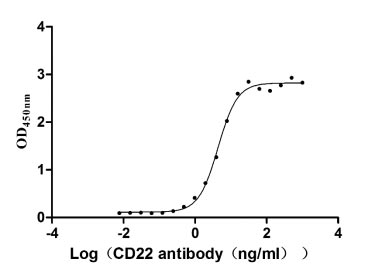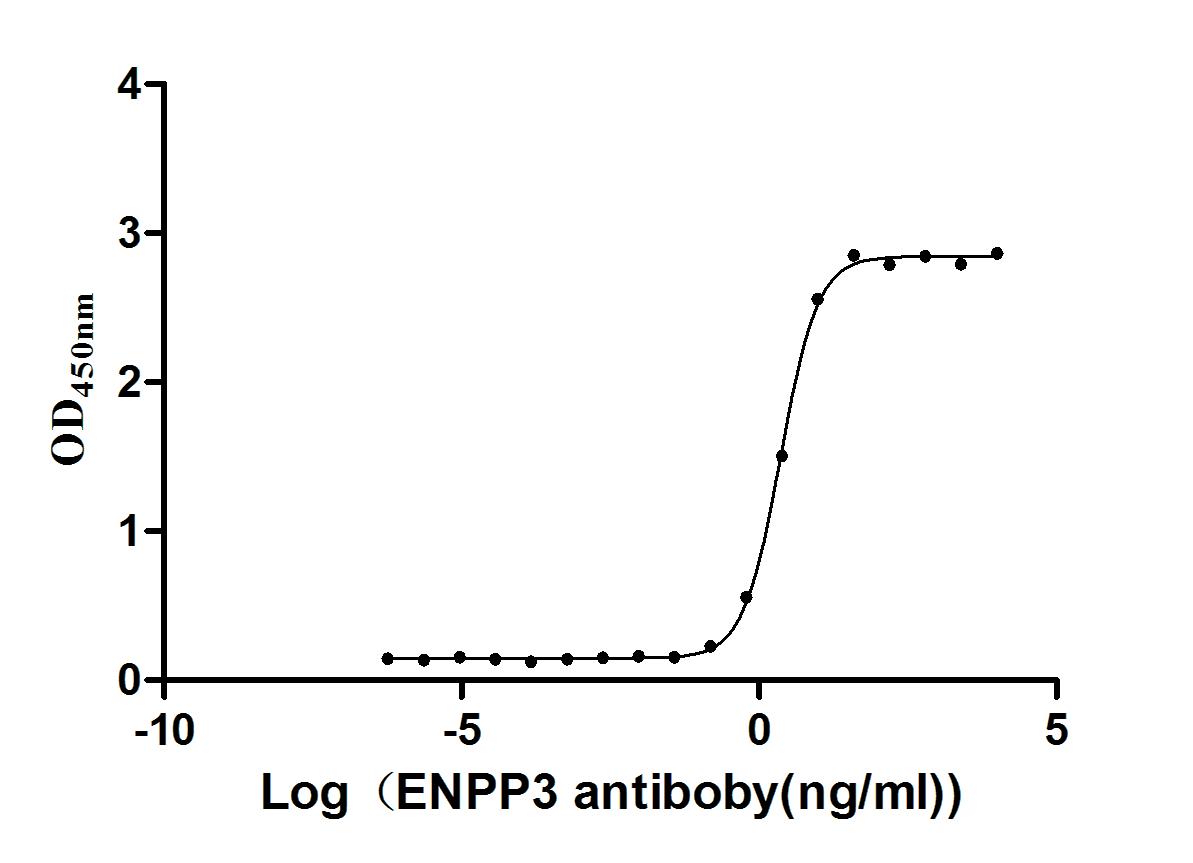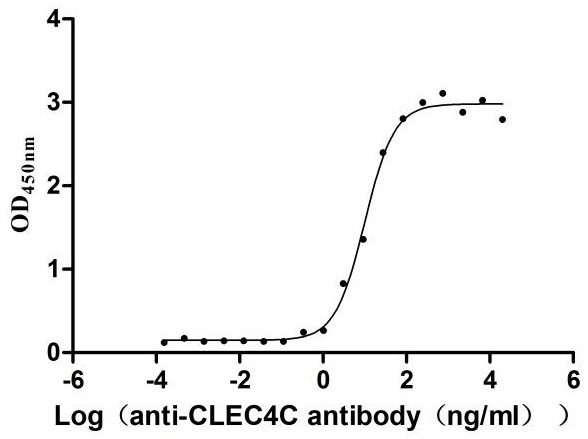Recombinant Mouse Long-chain fatty acid transport protein 1 (Slc27a1), partial
-
中文名稱:小鼠Slc27a1重組蛋白
-
貨號:CSB-YP713890MO
-
規(guī)格:
-
來源:Yeast
-
其他:
-
中文名稱:小鼠Slc27a1重組蛋白
-
貨號:CSB-EP713890MO
-
規(guī)格:
-
來源:E.coli
-
其他:
-
中文名稱:小鼠Slc27a1重組蛋白
-
貨號:CSB-EP713890MO-B
-
規(guī)格:
-
來源:E.coli
-
共軛:Avi-tag Biotinylated
E. coli biotin ligase (BirA) is highly specific in covalently attaching biotin to the 15 amino acid AviTag peptide. This recombinant protein was biotinylated in vivo by AviTag-BirA technology, which method is BriA catalyzes amide linkage between the biotin and the specific lysine of the AviTag.
-
其他:
-
中文名稱:小鼠Slc27a1重組蛋白
-
貨號:CSB-BP713890MO
-
規(guī)格:
-
來源:Baculovirus
-
其他:
-
中文名稱:小鼠Slc27a1重組蛋白
-
貨號:CSB-MP713890MO
-
規(guī)格:
-
來源:Mammalian cell
-
其他:
產(chǎn)品詳情
-
純度:>85% (SDS-PAGE)
-
基因名:
-
Uniprot No.:
-
別名:Slc27a1; Fatp; Fatp1; Long-chain fatty acid transport protein 1; FATP-1; Fatty acid transport protein 1; EC 6.2.1.-; Fatty acid transport protein; Solute carrier family 27 member 1
-
種屬:Mus musculus (Mouse)
-
蛋白長度:Partial
-
蛋白標(biāo)簽:Tag?type?will?be?determined?during?the?manufacturing?process.
The tag type will be determined during production process. If you have specified tag type, please tell us and we will develop the specified tag preferentially. -
產(chǎn)品提供形式:Lyophilized powder
Note: We will preferentially ship the format that we have in stock, however, if you have any special requirement for the format, please remark your requirement when placing the order, we will prepare according to your demand. -
復(fù)溶:We recommend that this vial be briefly centrifuged prior to opening to bring the contents to the bottom. Please reconstitute protein in deionized sterile water to a concentration of 0.1-1.0 mg/mL.We recommend to add 5-50% of glycerol (final concentration) and aliquot for long-term storage at -20℃/-80℃. Our default final concentration of glycerol is 50%. Customers could use it as reference.
-
儲存條件:Store at -20°C/-80°C upon receipt, aliquoting is necessary for mutiple use. Avoid repeated freeze-thaw cycles.
-
保質(zhì)期:The shelf life is related to many factors, storage state, buffer ingredients, storage temperature and the stability of the protein itself.
Generally, the shelf life of liquid form is 6 months at -20°C/-80°C. The shelf life of lyophilized form is 12 months at -20°C/-80°C. -
貨期:Delivery time may differ from different purchasing way or location, please kindly consult your local distributors for specific delivery time.Note: All of our proteins are default shipped with normal blue ice packs, if you request to ship with dry ice, please communicate with us in advance and extra fees will be charged.
-
注意事項:Repeated freezing and thawing is not recommended. Store working aliquots at 4°C for up to one week.
-
Datasheet :Please contact us to get it.
靶點詳情
-
功能:Mediates the ATP-dependent import of long-chain fatty acids (LCFA) into the cell by mediating their translocation at the plasma membrane. Has also an acyl-CoA ligase activity for long-chain and very-long-chain fatty acids. May act directly as a bona fide transporter, or alternatively, in a cytoplasmic or membrane-associated multimeric protein complex to trap and draw fatty acids towards accumulation. Plays a pivotal role in regulating available LCFA substrates from exogenous sources in tissues undergoing high levels of beta-oxidation or triglyceride synthesis. May be involved in regulation of cholesterol metabolism. Probably involved in fatty acid transport across the blood barrier.
-
基因功能參考文獻(xiàn):
- this study shows that FATP1 regulates the production of inflammatory cytokines through ceramide and the c-Jun N-terminal kinase signaling pathway PMID: 29272817
- Macrophage Fatp1 limits atherogenesis in LDL receptor knockout mice. PMID: 29035781
- our results suggest that FATP1 localized at the basal membrane of brain microvessels contributes to the transport of docosahexaenoic acid, taurine and biotin into the brain PMID: 28035674
- MicroRNA-199a targets FATP1 and inhibits the adipogenic transdifferentiation of cultured myoblasts. PMID: 27562723
- These results suggest that n-3 polyunsaturated fatty acids could improve lipid oxidation-related enzymes in liver subjected to hemorrhagic shock/resuscitation. PMID: 27110821
- Transgenic expression of FATP1 in suprabasal keratinocytes rescued the phenotype of Fatp4 mutants, and FATP1 sorted to the same intracellular organelles as endogenous FATP4 PMID: 25184958
- FATP1 was localized in mitochondria, in the outer membrane and intermembrane parts, of mouse skeletal muscle PMID: 24858472
- Fatp1 deficiency affects retinal light response and dark adaptation, and induces age-related alterations. PMID: 23166839
- Overexpression of Fatp1 in skeletal muscle increased the rate of long-chain fatty acid transport and channelled these lipids to oxidation, not to intramuscular lipid accumulation. PMID: 21442160
- FATP1 inhibits 11-cis retinol formation via interaction with the visual cycle retinoid isomerase RPE65 and lecithin:retinol acyltransferase PMID: 20356843
- The FATP1 enhanced the activity of 2-oxoglutarate dehydrogenase independently of its acyl-CoA synthetase activity whereas silencing of FATP1 in 3T3-L1 adipocytes resulted in decreased activity of 2-oxoglutarate dehydrogenase. PMID: 19535819
- FATP1, like FAT/CD36, is associated with mitochondria and has a role in mitochondrial oxidation of fatty acids. PMID: 19429947
- Insulin causes fatty acid transport protein translocation PMID: 11970897
- FATP1 homodimeric complexes play an important role in cellular fatty acid import. PMID: 12533547
- murine fatty acid transport protein 1 has Acyl-CoA synthetase activity PMID: 12937175
- FATP1 has a role in insulin resistance and intramuscular accumulation of fatty acyl-CoA PMID: 14991074
- In MHC-FATP mice, increased cardiac myocyte FATP1 overexpression increases uptake in the setting of normal plasma substrate concentrations, providing the 1st demonstration that FATP1 overexpression augments FFA tissue import & causes cardiomyopathy. PMID: 15618539
- the different mmFATP isoforms play unique roles in fatty acid trafficking, including the transport of exogenous long-chain fatty acids PMID: 15699031
- Together, our findings suggest that a constitutive interaction between FATP1 and ACSL1 contributes to the efficient cellular uptake of LCFAs in adipocytes through vectorial acylation. PMID: 16357361
- Insulin-stimulated fatty acid uptake is completely abolished in FATP1-null adipocytes and greatly reduced in skeletal muscle. PMID: 16611988
- Stimulation of fatty uptake by isoproterenol required both protein kinase A and mitogen-activated kinase signaling and is completely dependent on FATP1 expression. PMID: 17130465
- PPARgamma, even in the absence of exogenous activators, is required for normal rates of fatty acid uptake in oxidative skeletal muscle via mechanisms independent of AMPK and fatty acid transport protein 1. PMID: 18653710
- fatty acid influx mediated by FATP1 regulates AMPK and provides a potential regulatory mechanism for balancing de novo production of fatty acids from glucose metabolism with influx of preformed fatty acids via phosphorylation of acetyl-CoA carboxylase. PMID: 19560442
顯示更多
收起更多
-
亞細(xì)胞定位:Cell membrane; Single-pass membrane protein. Endomembrane system; Single-pass membrane protein. Cytoplasm.
-
蛋白家族:ATP-dependent AMP-binding enzyme family
-
組織特異性:Highest expression in skeletal muscle, heart and fat. Lower levels in brain, kidney, lung, liver and testis. No expression in spleen or intestine.
-
數(shù)據(jù)庫鏈接:
Most popular with customers
-
Recombinant Human B-cell receptor CD22 (CD22), partial (Active)
Express system: Mammalian cell
Species: Homo sapiens (Human)
-
Recombinant Human Insulin growth factor-like family member 1 (IGFL1) (Active)
Express system: Mammalian cell
Species: Homo sapiens (Human)
-
Recombinant Human Poliovirus receptor (PVR) (I340M), partial (Active)
Express system: Mammalian cell
Species: Homo sapiens (Human)
-
Express system: Mammalian cell
Species: Homo sapiens (Human)
-
Recombinant Mouse Claudin-18 (Cldn18)-VLPs (Active)
Express system: Mammalian cell
Species: Mus musculus (Mouse)
-
Express system: Mammalian cell
Species: Homo sapiens (Human)
-
Recombinant Macaca fascicularis zymogen granule protein 16 homolog B (ZG16B) (Active)
Express system: Mammalian cell
Species: Macaca fascicularis (Crab-eating macaque) (Cynomolgus monkey)
-
Recombinant Human C-type lectin domain family 4 member C (CLEC4C), partial (Active)
Express system: Mammalian cell
Species: Homo sapiens (Human)




-AC1.jpg)

-AC1.jpg)













